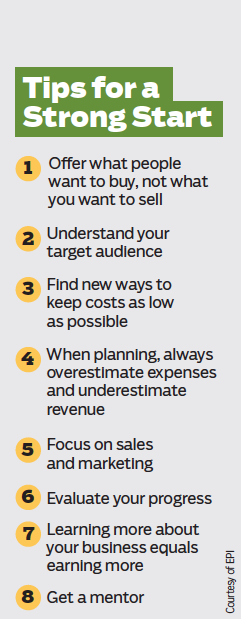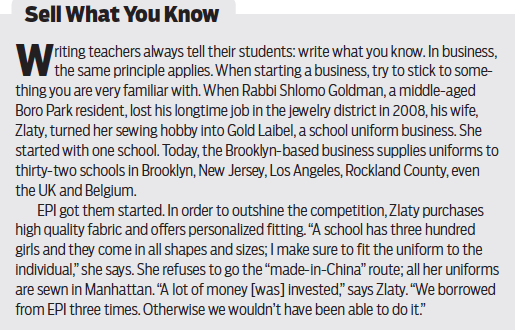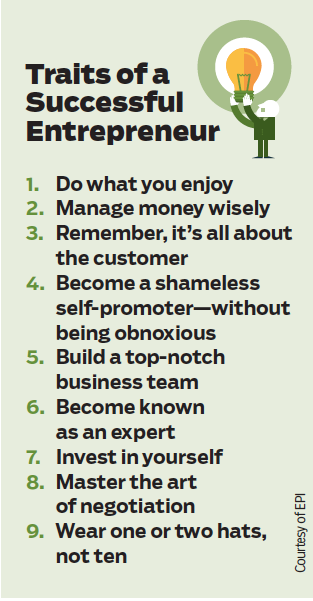The New Entreprenuer
Why the entrepreneurial spirit is alive and well and booming in the Orthodox community
The recession of 2008 may have left thousands of Orthodox Jews out of work, but apparently not out of hope. Rather than settle for jobs far below their skill sets and financial needs, a growing number are launching successful businesses of their own.
While exact statistics of Orthodox entrepreneurs in the country are not available, thanks to a growing number of Jewish organizations offering interest-free loans to new businesses, the entrepreneurial spirit is alive and well and booming in the Orthodox community.
“If you want to start your own business, now is the time to do it,” says Srulie Rosner, international director of the OU Job Board, an employment program that provides a plethora of services including an online job board, e-learning classes, job fairs, résumé and cover letter critiques, networking events and career counseling.
“Today, you can not only get a substantial interest-free loan but also mentorship to make sure you will succeed.”
Who are these new Orthodox entrepreneurs? They are middle-aged men and women who lost their longtime jobs to downsizing. They are struggling fathers and mothers who realize their day jobs can no longer support the high costs of frum life. They are young, energetic go-getters who prefer the satisfaction of being their own boss. They range from shop owners to high-tech developers, from Modern Orthodox to Chassidic, and they all have one thing in common: they possess a creative idea and a dream to strike out on their own.
Baby “Boomer”ang – Back to What You Love
When Chaim Friedman, forty-eight, owner of 3 to 5 Aquatics, lost his job at a brokerage firm, he immediately began job hunting. For two years, he pounded the pavement—to no avail. The bills piled high; his confidence plummeted. Residing in an affluent section of Woodmere, New York, he went from supporting several kollels in Israel to wondering how to put food on the table. While fishing for a viable way to support his family, he “caught a big one.” With the help of a loan from Emergency Parnassa Initiative (EPI), a New York-based nonprofit organization dedicated to assisting the unemployed, Friedman took his fascination with marine aquatics and began selling saltwater fish and live coral on eBay and Craigslist. He regularly imports live fish from Africa, Indonesia, Bali and Hawaii and ships them to customers across the country in special bags containing saltwater and pumped-in oxygen. For local walk-in customers, he keeps a stock of fish in the twenty fish tanks that occupy his basement. “I realized that my personality wouldn’t have allowed me to have a regular job,” says Friedman, who is an avid scuba diver. He’s thrilled to have turned a longtime hobby and passion into a growing parnassah (source of income).
Ageism compelled many Baby Boomers to switch gears and open businesses. “A guy who’s forty-five plus who doesn’t know the latest computer software can’t even get a job in an office or warehouse,” says Rosner. “He could try to catch up with classes for six months, but then he’s six months older and when he goes for a job interview, a competent guy in his twenties or thirties is also applying for the job. Whom are you going to hire? Entrepreneurship offers a viable way out for this population.
“[The middle-aged unemployed] are pushed into entrepreneurship. It’s similar to the turn of the century when [Eastern European Jewish] immigrants came to America,” says Rosner. “They couldn’t find jobs because they couldn’t speak the language and they wanted to remain shomer Shabbat. So they went into business—the push cart, the grocery store, the clothing store.” The same dynamic is at play here, insists Rosner. “Necessity is the mother of entrepreneurship.” But while he endorses the idea of starting one’s own business, he offers the aspiring entrepreneur a piece of advice: start small.
Rosner tells of a “genius programmer” in his late forties who came to him in the middle of the recession for help. “He couldn’t find a job with his [outdated] knowledge of technology,” says Rosner. “He took software classes and attended business seminars and still found himself hard-pressed to land a position.” With nowhere to turn, he procured a loan from a family member and opened a kosher gluten-free bakery. Eight months later, he called Rosner to thank him for his support and to let him know he was doing well. “He came to the realization that [even] if you can’t get a job, there’s something you can do.”
Chaya Fishman, in her mid-twenties, founder and executive director of The Jewish Woman Entrepreneur (JWE), a national organization aimed at supporting Jewish businesswomen, reports seeing a “huge influx” of Baby Boomers at the organization’s annual conferences. (See profile of Fishman.)
Ironically, Rabbi Zisha Novoseller, CEO/executive director of EPI, a Baby Boomer from Lakewood, was himself the victim of downsizing. After receiving a pink slip in 2008 from a company where he had been supervising dozens of employees, he soon realized that unemployment was not just his personal problem; it was a community-wide problem. “Unemployment was rippling through the frum community,” he says. “I saw the difficult circumstances people found themselves in. What does one do? Does he re-educate himself? Does he switch careers? Should he become an entrepreneur? And how does he morph from one career to another? A person has to consider all the factors involved in making such a decision.”

Rabbi Zisha Novoseller, CEO/executive director of EPI, has helped fund more than 160 businesses. Currently, EPI has many millions of dollars out on loan.
At the same time, a group of prominent businessmen who were aware of the problem thought it was imperative to do something. They approached Rabbi Novoseller and asked him to organize a program to assist the unemployed.
In 2009, he became CEO of EPI (the OU provides office space to EPI in its Manhattan headquarters). At the outset, Rabbi Novoseller realized that entrepreneurship was a realistic option for many of the unemployed or underemployed and launched a business gemach. Providing $25,000 to $50,000 interest-free loans to entrepreneurs, the EPI business gemach has funded more than 160 businesses and currently has many millions of dollars out on loan. The companies span a range of industries, from high-tech and e-commerce to beauty products and clothing.
EPI, which partners with the OU Job Board on many programs and services, provides mentors—essentially successful businessmen—to help guide aspiring entrepreneurs. “Whatever they need to be matzliach,” says Rabbi Novoseller. Currently, there are EPI branches in New Jersey, New York and Baltimore, and one is set to open in Los Angeles.
The New Wave of Young Entrepreneurs
Baby Boomers are not the only ones taking advantage of the interest-free loans.
When the Rosens married in 2006, they agreed that Mordechai would learn in kollel and, to supplement his stipend, Elisheva would do what she did best: sell clothes.
Elisheva cultivated her fashion and sales skills while single since she had friends in the industry and would accompany them to fashion trade shows.
As a young wife, she sold women’s clothing from her small apartment in Far Rockaway, New York. When the merchandise and customer traffic began taking over the couple’s living space, they moved to larger living quarters. At that point, the Rosens, in their thirties, came up with an idea. They noticed that Central Avenue, a major shopping thoroughfare in the Five Towns, lacked a store for “middle-priced” clothing. It was time to open a store.
They heard about EPI’s loan gemach from a friend. “We were warned that they would grill us,” says Mordechai. “They asked us why we thought the store could make it on Central Avenue when so many stores on the avenue stood vacant. We told them that our clientele say that there’s nothing like [our merchandise] on Central Avenue.” When EPI asked for their [sales and expenditures] projections for the year, the Rosens realized they had left out some key numbers. Nonetheless, they received a callback. EPI went over the plan with them to make sure it made sense, then approved a loan. In 2010, the Rosens opened Fame, a trendy women’s clothing boutique. As it turns out, the Rosens were on the mark. Having outgrown their first store, they recently moved to a new space triple the size.
For young people trying to establish themselves in a career, entrepreneurship is becoming an increasingly popular option. “Entrepreneurship has always been something very Jewish, especially in the Orthodox community where there are many [who are] not interested in pursuing a college education,” says Rabbi Yehoshua Werde, founder and director of Crown Heights Young Entrepreneur (CHYE), a business resource center that supports entrepreneurship in the neighborhood.
Rabbi Werde, who launched the year-old initiative, runs a variety of programs that raise the entrepreneurial consciousness in the community. “Not every young man goes into rabbanus or shlichus. We want to make sure that if someone wants to start a business, he’ll have the opportunity to do it right,” says Rabbi Werde. The organization, which offers lectures, mentoring, credit counseling, as well as local workspace and a lounge equipped with a business resource library, recently ran a “Shark Tank” inspired event, inviting prominent business professionals to connect with the community’s aspiring entrepreneurs. “So many [of our] young people are asking, ‘Should I go into business? Should I go to college?’ There was nothing here to help them,” says Rabbi Werde. While CHYE is currently focused on the Crown Heights community, it hopes to spread out to other communities in the future.
Rising Costs
Another major factor contributing to the rise in Orthodox entrepreneurship is the high cost of Orthodox life.

Elisheva and Mordechai Rosen opened Fame, a trendy women’s clothing store on Central Avenue in Cedarhurst, New York, with the help of EPI.
Photo courtesy of Elisheva Rosen
“Even if you choose to live in an area with a lower cost of living, tuition would still amount to about eight thousand per child,” says Rabbi Judah Isaacs, director of community engagement at the OU. “If you have four children, you’re talking about thirty-two thousand dollars annually just for tuition. Add housing, shul membership, food, clothing . . . regardless of community, the costs associated with living an Orthodox lifestyle are much greater. And the costs keep rising; people’s incomes aren’t keeping up.”
In a recent article in Tablet, an online Jewish magazine, Rabbi Ilan Feldman, rav of Beth Jacob Atlanta, bemoaned the rising costs of the Orthodox lifestyle for Jews in his community where costs are significantly lower than in the major Jewish centers.
“For someone making sixty thousand dollars a year in America, that’s middle class,” Rabbi Feldman is quoted as saying. “But in this Orthodox community, sixty thousand dollars means you aren’t going to make it.”
“Passover alone is usually a three-thousand-dollar holiday,” says Rabbi Feldman.
Fishman of the JWE says that entrepreneurship appeals to so many in the frum world because of simple economics. She cites an IZA study (IZA is an independent institute that conducts labor market research) indicating that the average entrepreneur’s income is 50 percent higher than that of the traditional employee, providing that he had sufficient education with which to conduct his business.
“Yeshivah tuition and kosher food are things you just can’t cut back on,” says Esty Margaretten, a thirty-six-year-old graphic artist from Brooklyn who procured a start-up loan from EPI to create the Rina and Dina Collection, the frum world’s alternative to Hello Kitty. “Working for a salary has its upside—you get your weekly paycheck—but then you are limited by how much income you can generate. If you are an entrepreneur, there’s a possibility of [making a lot] more money.”
The Rina and Dina collection features two modestly dressed little girls who promote mitzvot and good middot and includes stickers, crafts, games, puzzles, stationary, pencil cases, key rings and a beautifully illustrated coloring book.
In response to mounting requests, Margaretten recently introduced a boys’ version—the Pinny and Shimmy collection. Currently, the collections can be found in Judaica stores in New York, Baltimore, Florida, Los Angeles, Toronto, Israel and Europe.
A Dose of Realism
As successful Orthodox entrepreneurs will attest, it takes more than a loan to launch a profitable business; it takes a lot of siyata d’Shmaya (Heavenly assistance).
Data from the US Bureau of Labor Statistics show that less than two-thirds of all start-ups make it to their third year and only 35 percent survive their first decade.
Rabbi Novoseller agrees that making a business profitable is no simple feat. “The fact that someone is driven and smart is not enough.” The most common mistake new entrepreneurs make: not understanding money management. Since most of those who come to Rabbi Novoseller have not attended business school, they often don’t realize how much money they realistically need to start and maintain the business, how they will collect outstanding debts, et cetera. “All of this comes from experience,” says Rabbi Novoseller, who connects new entrepreneurs with mentors in the appropriate fields. But he will only make the connection if he feels the business has a realistic chance of success. Due to his careful screening process, only five percent of the businesses that EPI has funded have either failed or are experiencing difficulties. Out of the 160 businesses that EPI has helped fund, it rejected dozens that were not viewed as “viable.”
“Oftentimes, people ask me, ‘how could you start a business with only fifty or one hundred thousand dollars?’” says Rabbi Novoseller. “The answer is we tend to fund businesses that are not just ‘good ideas,’ but that have a competitive advantage. For example, a family member who is a manufacturer and able to give the prospective entrepreneur a drastic discount.”
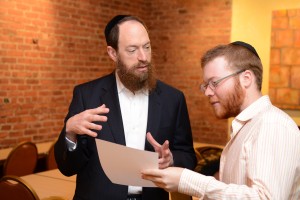
Shmuel Goldman (left), former COO of Intrasphere Technologies Inc, mentors Bentzion Plotkin as part of CHYE’s mentoring program.
Photo courtesy of Rabbi Yehoshua Werde of CHYE
Fishman says that while entrepreneurship is a great path, “it’s not for everyone.”
Her advice to those just starting out: do your market research—is your service or product already out there? If it is, how will yours be different? Most importantly, crunch your numbers. She recalls meeting more than a few women who did not spend enough time working on a business plan. They borrowed money from family and friends and got into trouble because they didn’t figure out when they will break even or how they will cover certain expenses. She’s also seen women get overly excited when investors express interest in their ideas and end up ceding too much control of their company.
Oftentimes, Fishman says, the very qualities that make people effective entrepreneurs—what she refers to as “the go-getter, shaker, mover personality”—also causes them to fail because they lack the patience to do their homework. “The thrill of entrepreneurship should be balanced with thinking about the details.”
Ultimately all new entrepreneurs require the same core characteristics: perseverance, stamina and—a back-up plan.
Women in Business
Despite the discouraging statistics, more and more frum women are drawn to entrepreneurship. “We have a lot of single moms in our network and they can’t work a traditional job,” says Fishman. “Having control over your schedule is a powerful thing.”
For Chassidic women especially, most of whom do not have a college education and who have large families and need the flexibility, entrepreneurship makes a lot of sense.
Noticing this trend, the Manhattan-based Hebrew Free Loan Society (HFLS) began offering an entrepreneurial course geared toward Chareidi women three years ago. Since then, some 200 Chareidi women have taken the microenterprise course, offered in Boro Park and Williamsburg, which covers topics including market analysis, cash flow reports, writing a business plan, defining your product and service, knowing your competitive advantage and your target market, profit and loss statements and many other aspects of running a successful business.
Shana Novick, executive director of the HFLS, said the course was inspired by similar programs in Israel. Many students in the microenterprise course qualify for an HFLS interest-free loan up to $25,000.
Via its Orthodox Microenterprise Program, which also includes entrepreneur classes for men, HFLS has given more than 100 loans to members of the Orthodox community since its inception in 2008, totaling more than two million dollars.
Students are not admitted into the course unless they have a concrete business idea. “If you have what it takes—the entrepreneurial spirit, a certain temperament—then our job is to position you for success,” says Novick.
“The nice thing about loan capital is that it revolves; you give it out and get it back,” says Novick. “The businesses are on solid ground, and will bring [more money] into the Jewish community. It’s a good investment.”
Born to be Boss
Then there are those who become entrepreneurs simply because they can’t imagine doing anything else.
Joel Gottehrer, twenty-six, owner of Better Health Studios in Brooklyn, loves to work out. At fifteen, his family hired a personal trainer for him. By the time he was nineteen, he was a certified personal trainer and started working for a high-end gym in Manhattan, where he soon ranked as one of the top trainers. He decided to try freelancing in Brooklyn, going to clients’ homes. “I see a lot of people in the community huffing and puffing, overweight, not exercising, with diabetes, at risk of a heart attack,” he says. “I thought it was time to help.” He ran a fledgling business out of a rented basement. After a year, he moved to a larger facility and bought more equipment. But he still wasn’t making money.
His wife pitched in and took the women’s HFLS course. “She saw the chaos. I didn’t know about the numbers, how to make a business plan,” says Gottehrer. “I thought, ‘I know how to train, so I’ll just do it.’” Armed with the business fundamentals and an HFLS loan, he now operates out of a state-of-the-art facility in Boro Park with a health shake station, locker room, showers, bathrooms, new equipment and a steady clientele ranging from eight to eighty-nine years of age. He travels across the US for business workshops and fitness conventions. He’s happy to report that the gym is more than breaking even.
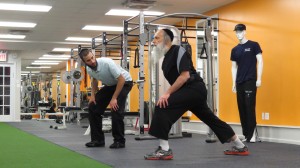
Joel Gottehrer (left), owner of Better Health Studios in Brooklyn, with a client.
Photo courtesy of Joel Gottehrer
Gottehrer believes success is as much a state of mind as it is know-how. He stresses the importance of surrounding oneself with supportive, positive people. “You have to make sure that every area of your life is thriving, primarily your family and your health—physically and spiritually. Knowing I can’t do this without Hashem’s constant help has strengthened my connection with Him.”
The Fulfillment Factor
Technology has also made entry into the entrepreneurial world somewhat easier for the tech-savvy. “The whole technology revolution has changed things dramatically,” says Rabbi Werde. “The Amazon/eBay phenomenon has leveled the playing field. If someone has a unique product and price, [he can] market [it in a way he] could never have done before. There’s a platform out there where you have a potential market of millions. Everyone looking for a good deal goes to Amazon and eBay.”
Young entrepreneurs are into creating apps and games, says Rosner of the OU Job Board. One such creative mind is Adam Lewis, a Modern Orthodox thirty-one-year-old living in Teaneck, New Jersey, who created an app that could render the resume obsolete. Reinventing the job application process, Lewis launched Apploi via his New York-based company Innovative CV. Apploi is a mobile recruiting app enabling job candidates to respond to questions from an employer using text, video or audio. This new interactive format—which is highly attractive to both job seekers and employers—boasts roughly 50,000 new candidates a month and 1,400 companies that post jobs with Apploi.

Participants at a recent Jewish Woman Entrepreneur (JWE) conference. Photo courtesy of Janet Century
“[Opening] clothing stores and coffee shops are creating businesses that already exist,” says Lewis. “What I’m doing is creating new technology that actually defines a market.”
Any discussion about the steady stream of entrepreneurs cropping up in the frum world cannot overlook the fulfillment factor. Many are driven to be their own bosses simply because to them, it is way more satisfying to work for oneself. “If you hope to afford tuition and live a comfortable life, there’s no such thing anymore as a nine-to-five job,” says Lewis. “If you’re going to be working crazy hours, you want do something fulfilling.”
A former attorney at a top consulting firm, Lewis admits transitioning to being on his own was difficult. “I came from a company with an annual revenue of about twenty billion dollars; [I was on] a very solid career path, where you go all the way up the chain to become a partner. But if you get it right, entrepreneurship can be much more rewarding,” he says.
Whether it is due to the aging of the Baby Boomers, the need for flexibility and independence or the technological revolution, the upsurge in entrepreneurship in our community speaks of the creative spirit, drive and desire to contribute that continue to define Orthodox life.
To hear tips on becoming a successful entrepreneur from Rabbi Zisha Novoseller, visit http://www.ou.org/life/community/savitsky-novoseller/.
More In This Section
A Business of Her Own
Growing numbers of Orthodox women from across the spectrum of Orthodoxy are using their ambition, ingenuity and creativity to launch successful businesses of their own.
Building a Community of Women: Chaya Fishman by Avigayil Perry
Making Your Dream House Come True: Chaya Ruchi Gross by Avigayil Perry
Dappling in Cleaning Formulas: Tamar Rosenthal and Dana Rubenstein by Avigayil Perry
Growing a Tree of Knowledge: Nechama Salfer by Avigayil Perry



